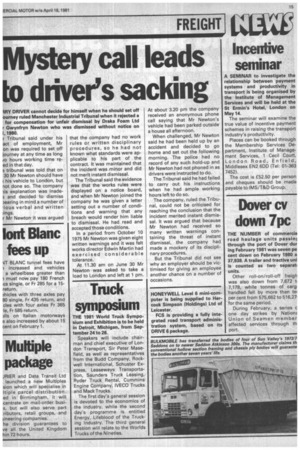Mystery call leads to driver's sacking
Page 17

If you've noticed an error in this article please click here to report it so we can fix it.
3RY DRIVER cannot decide for himself when he should set off ourney ruled Manchester Industrial Tribunal when it rejected a for compensation for unfair dismissal by Draka Foam Ltd r Gwynfryn Newton who was dismissed without notice on I. 1980.
) Tribunal said under his act of employment, Mr on was required to set off journey at any time as long ro hours working time reed in that day.
3 tribunal was told that on 30 Mr Newton should have his vehicle to London, but not done so. The company is explanation was madeand decided to dismiss )earing in mind a number of lous verbal and written
that the company had no work rules or written disciplinary procedures, so he had not known what standards were applicable to his part of the contract. It was maintained that the incident was minor and did not merit instant dismissal.
The Tribunal said the evidence was that the works rules were displayed on a notice board, and when Mr Newton joined the company he was given a letter setting out a number of conditions and warning that any breach would render him liable to dismissal. He had read and accepted those conditions.
In a period from October 10 1975 Mr Newton was given eight written warnings and it was felt works director Edwin Martin had exercised considerable tolerance.
At 11.30 am on June 30 Mr Newton was asked to take a load to London and left at 1 pm. At about 3.20 pm the company received an anonymous phone call saying that Mr Newton's vehicle had been parked outside a house all afternoon.
When challenged, Mr Newton said he had been held up by an accident and decided to go home and set out the following morning. The police had no record of any such hold-up and Mr Newton had not phoned in as drivers were instructed to do.
The Tribunal said he had failed to carry out his instructions when he had ample working hours left to do so.
The company, ruled the Tribunal, could not be criticised for reaching the conclusion that the incident merited instant dismissal. It was argued that because Mr Newton had received so many written warnings containing the threat of instant dismissal, the company had made a mockery of its disciplinary procedures.
But the Tribunal did not see why an employer should be victimised for giving an employee another chance on a number of occasions.




















































































